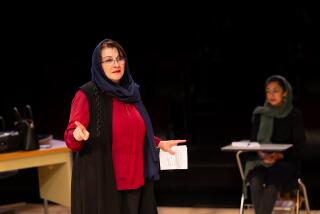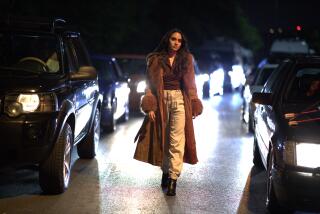LOS ANGELES FESTIVAL : THE LENGTHY BUT WORTHY TRIP OF ‘MAHABHARATA’
- Share via
“The Mahabharata”: a book like no other. And a theatrical journey like no other. Arduous? Yes. Worth taking? Yes. Transforming? Too early to say.
The physical side first. (If there’s one thing that “The Mahabharata” is sure of, it’s that we have bodies.)
Saturday’s U.S. premiere of Peter Brook and Jean-Claude Carriere’s stage version of India’s mother-epic took more than eight hours to perform. Not eight hours straight. There were two half-hour breaks during the afternoon and an hour’s recess for dinner.
Still, that’s a long sit, even though the backs of the bleachers at Hollywood’s Raleigh Studios are padded. People with back problems should pass up the marathon version of “The Mahabharata” and take the journey over three nights, as is offered during the week.
A gradual immersion into the world of “The Mahabharata” also might be spiritually preferable. This is one of the world’s great legends. It seems rude, somehow, to try to take it in all at once, like a student cramming for an exam.
On the other hand, it gives you a sense of what a vast poem “The Mahabharata” must be. And this version only covers about one fifth of it--just the high points, as the Wooster Group would say. The “Bhagavad-Gita” section, for example, is compressed into a few backhand whispers from Krishna (Bruce Myers) to his protege, Yudishthira (Andrzej Seweryn).
At that, there’s a lot to take in. Again, Brook and Carriere have made every effort to make this easy for the viewer. The language of the piece couldn’t be more down to earth, and Brook’s actors play it with a simplicity that just escapes being austere.
Still, it’s good to have the terms of the story in advance. It is not so dense as the first hour would suggest. Although gorgeously staged, this part suggests the chapters in the Bible where we learn that so-and-so begat such-and-such.
The story proper concerns a family feud, not very different from the mountain feuds that figure in the tales of another Los Angeles Festival group, Roadside Theatre. Again, somebody’s nose gets put out of joint when somebody else in the family seems to be having all the luck.
This feud, however, involves the whole world, which is to say, India. The story starts with a “friendly” game of dice between cousins--it could be made a little clearer that the dice are loaded--and it ends with the sun rising over 18 million corpses.
This could be an exaggeration, but that’s one of the devices of the good storyteller. And this version of “The Mahabharata” is definitely a “tale told,” the teller being an old man (Robert Langdon Lloyd) who occasionally has to step in like a referee when one of his characters forgets the rules of the game.
Paradoxically, one of the lessons of the story is that at a certain time the rules of the game must be broken. The great thing is to know when that time has arrived. The mighty battle that ends the play is won by cheating. This is something that the good man must do in order to keep even with the out-and-out rascal, such as Yudishthira’s cousin, Duryodhana (Georges Corraface). There is nothing holier-than-thou about “The Mahabharata.”
There is also a lot of sex in it. The act of love is seen as both natural and delightful, assuming the codes are observed. If not, one proceeds at one’s peril. For instance, it’s dangerous to spy on two gazelles making love. They might be magic gazelles who will call a curse down on you. And it’s most imprudent to bed down with the faithful wife of the strongest man in the world, unless you have checked under the covers first. Yoshi Oida as a prurient prince makes this very mistake with the lovely Mallika Sarabhai.
The joke is on him, and we see it as a joke. Fools are fools, and “The Mahabharata” isn’t afraid to laugh at them.
But in this world it’s also dangerous to avoid love. A young man swears off women at the start of the tale (Sotigui Kouyate--a touchingly old man by the time it’s over). This act can be seen as the root of the whole feud, as the bad cousins are not slow to point out.
It’s one of several points where “The Mahabharata” (composed God knows when, but well before the Christian era) refuses to simplify human behavior for the sake of pointing an ethical lesson, as the tales in our Bible do.
Here, virtue doesn’t always pay off. Perhaps to point out that no human act is ever completely selfless. As the little boy listening to the tale (Akram Khan) points out, maybe the young man didn’t like women all that much in the first place.
Like a Zen master, “The Mahabharata” is not a story that wants to be read too easily. Yudishthira, a sensitive man who has had to wrestle with himself at every turn in the story, is incensed to enter Paradise and find his crass cousin there. On what grounds? The Western viewer has the same question. It isn’t answered.
But there is a beautiful final image, an image that’s been presaged by a repeated physical motif: the unrolling of gorgeous sheets and carpets to set the next scene. (The fabrics in this show are as resplendent as the river-bank setting is plain. Both were designed by Chloe Obolensky.)
Somehow the action suggests the laying of a cloth for a picnic. And, as the story fades, we seem to be watching just that: a family gathered on several blankets on the river at dusk, with candles flickering and food quietly being passed. It is the same clan whose self-destruction we have just witnessed. Are we in the past, the present or the future?
If that sounds slightly dreamlike, the acting of the piece isn’t at all that way. Everything’s very precise and pared away, sometimes to the point of monotony. (The voices in particular. It’s wonderfully ecumenical to have the tale told in a variety of foreign accents, but the men especially tend to be a little wooden vocally--clear, but inflexible.)
The women don’t let anything stop them from coming across. Each expresses her character to the fingernail, and all convey a marvelous female indignation that the men in the tale are making such a hash of it all. Miriam Goldschmidt, Mireille Maalouf and Mallika Sarabhai don’t stand in their husbands’ shadows at all--quite the reverse.
Much more is to be said about “The Mahabharata.” Its use of a carpet-side musical ensemble twanging pungent native instruments, again somewhat sparingly. Its use of fire and water and sand, suggesting Brook’s last collaboration with Carriere, “Carmen.” A certain smugness in the voice of the storyteller, or was that imagined?
The show also leaves you mulling the possibility of staging one of the great Western epics this way: “The Iliad” or “The Odyssey,” for instance. Those are our stories in a way that “The Mahabharata” can never be. At the moment, however, this reviewer feels something like a rattlesnake who has swallowed a rabbit in one gulp. The impulse isn’t to discuss, but to digest.
‘THE MAHABHARATA’
Peter Brook’s and Jean-Claude Carriere’s version of the Indian epic, at the Raleigh Studios in Hollywood. Presented by the Los Angeles Festival. Sets and costumes Chloe Obolensky. With Miriam Goldschmidt, Corinne Jaber, Mireille Maalouf. Helene Sarabhai, Tam-Sir, Urs Bihler, Ryszard Cieslak, Georges Corraface, Mamadou Dioume, Richard Fallon, Nolan Hemmings, Ciaran Hinds, Jeffery Kissoon, Sotigui Kouyate, Tuncel Kurtiz, Robert Langdon Lloyd, Mavuso Mavuso, Vittorio Mezzogiorno, Bruce Myers, Yoshi Oida, Andrzej Seweryn, Tapa Sudana, Mahoud Tabrizi-Zadeh, Akram Khan, Leo Moriya, Mipam Thurman, Antonin Stahyl-Viswanadthan. Plays Tuesdays-Thursdays at 7:30 p.m., with marathon performances Saturdays at 1 p.m. Ends Oct. 3. 650 N. Bronson Ave. Tickets $90. (213) 622-3771.
More to Read
The biggest entertainment stories
Get our big stories about Hollywood, film, television, music, arts, culture and more right in your inbox as soon as they publish.
You may occasionally receive promotional content from the Los Angeles Times.










